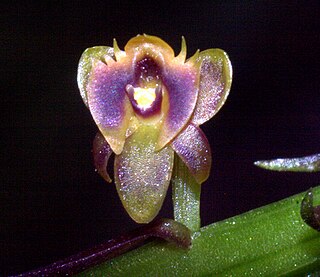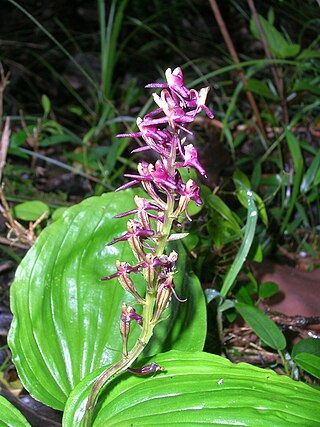
The Philippines, officially the Republic of the Philippines, is an archipelagic country in Southeast Asia. In the western Pacific Ocean, it consists of 7,641 islands which are broadly categorized in three main geographical divisions from north to south: Luzon, Visayas, and Mindanao. The Philippines is bounded by the South China Sea to the west, the Philippine Sea to the east, and the Celebes Sea to the south. It shares maritime borders with Taiwan to the north, Japan to the northeast, Palau to the east and southeast, Indonesia to the south, Malaysia to the southwest, Vietnam to the west, and China to the northwest. It is the world's twelfth-most-populous country, with diverse ethnicities and cultures. Manila is the country's capital, and its most populated city is Quezon City; both are within Metro Manila.
Gymnoplectron is a genus of cave wētā in the family Rhaphidophoridae, endemic to New Zealand.

Crepidium, commonly known as 沼兰属 or spur orchids is a genus of about three hundred species of orchids in the family Orchidaceae. Plants in this genus are evergreen, mostly terrestrial plants with short stems lying on the ground, two or more relatively large, pleated leaves and small, non-resupinate flowers with spreading sepals and petals. The genus is widely distributed in the tropics.
Hanna Bogna Margońska, born 1968 is a Polish botanist known for her work on orchids.

Glottiphyllum longum is a species of succulent plant in the family Aizoaceae, native to the Western Cape and Eastern Cape Provinces, South Africa.

Crepidium moluccanum, synonym Crepidium ramosii, is a species of plant in the family Orchidaceae endemic to the Philippines.

Crepidium quadridentatum is a species of plant in the family Orchidaceae, endemic to the Philippines

Crepidium dentatum, the toothed Crepidium, is a species of plant in the family Orchidaceae, endemic to the Philippines.

Crepidium quadrilobum is a species of plant in the family Orchidaceae, endemic to the Philippines.

Crepidium binabayense is a member of the family Orchidaceae, endemic to the Philippines.

Crepidium tjiwideiense is a species of the family Orchidaceae endemic to the Philippines.

Crepidium purpureiflorum is a member of the family Orchidaceae endemic to the Philippines.

Malaxideae is an orchid tribe in the subfamily Epidendroideae.

Malaxidinae is an subtribe of orchids in the tribe Malaxideae of the subfamily Epidendroideae.
Crepidium elegans is a species of epidendroid orchids in the tribe Malaxideae.

Crepidium fimbriatum, commonly known as the fringed spur orchid, is a plant in the orchid family and is endemic to tropical Far North Queensland. It is an evergreen, terrestrial orchid with a fleshy stem, wavy leaves and many purple flowers crowded on a purple flowering stem.
Crepidium fontinale, commonly known as the yellow spur orchid, is a plant in the orchid family and is endemic to the Northern Territory. It is an evergreen, terrestrial orchid with a fleshy stem, wavy leaves and many yellowish green flowers crowded on a green flowering stem.

Crepidium lawleri, commonly known as the small spur orchid, is a plant in the orchid family and is endemic to tropical far north Queensland. It is an evergreen, terrestrial orchid with an upright stem, dark green leaves and up to ten greenish cream-coloured flowers well spaced along a brittle flowering stem.

Crepidium marsupichilum, commonly known as the pouched spur orchid, is a plant in the orchid family and is endemic to tropical far north Queensland. It is an evergreen, terrestrial orchid with an cone-shaped stem, light green, shiny leaves and a large number of purple flowers crowded along a green and purple flowering stem.













